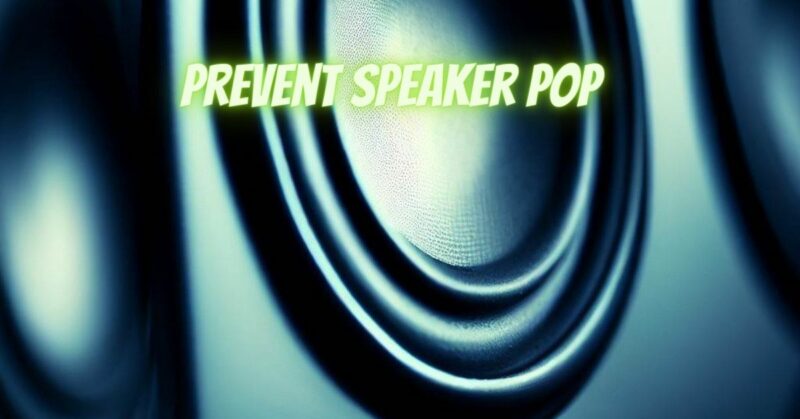Experiencing popping sounds from your speakers can be annoying and disruptive to your audio enjoyment. These sudden bursts of noise can be caused by various factors, but fortunately, there are steps you can take to prevent speaker popping and ensure a smooth and uninterrupted audio experience. In this article, we will explore practical tips and techniques to help you prevent speaker popping and maintain high-quality sound reproduction.
- Power Sequencing: Implementing proper power sequencing can help prevent speaker popping caused by power surges or voltage fluctuations. Start by turning on your audio source (e.g., preamp or audio interface), followed by the amplifier, and then the speakers. When powering off, reverse the sequence by turning off the speakers first, then the amplifier, and finally the audio source. This ensures a smooth flow of power and minimizes sudden voltage changes that can result in speaker popping.
- Use Power Conditioners or Surge Protectors: Power conditioners or surge protectors serve as a protective barrier between your audio equipment and electrical anomalies. These devices regulate and stabilize the incoming power, filtering out noise, voltage spikes, and surges that can cause speaker popping. Investing in a high-quality power conditioner or surge protector can provide added protection and peace of mind.
- Check Cables and Connections: Loose or faulty cables and connections can introduce static or interference that manifests as popping sounds in your speakers. Regularly inspect your cables for any signs of damage or wear and ensure that all connections are secure and properly seated. If you encounter crackling or popping noises, try reseating the cables or replacing them with high-quality ones to eliminate potential sources of interference.
- Grounding: Proper grounding is essential for minimizing electrical noise and interference. Ensure that all audio components, including the amplifier and audio source, are connected to a grounded power outlet or a dedicated ground wire. Consult an electrician if you suspect grounding issues in your home or studio setup.
- Audio Source Levels: Sudden changes in audio source levels, such as abruptly raising or lowering the volume, can lead to popping sounds in the speakers. Avoid making drastic volume adjustments, especially when powering on or off your audio equipment. Gradually increase or decrease the volume to minimize the risk of sudden voltage changes that can cause popping.
- Maintain Equipment and Perform Regular Maintenance: Regular equipment maintenance can help prevent speaker popping. Keep your speakers, amplifiers, and audio sources clean and free from dust and debris. Inspect and clean the speaker drivers, connectors, and ventilation ports to ensure optimal performance. Additionally, adhere to recommended maintenance schedules for any tube-based amplifiers, including tube replacements, to avoid issues that could lead to popping sounds.
Conclusion:
Speaker popping can be an inconvenience, but with the right preventive measures, you can maintain a smooth and uninterrupted audio experience. By implementing power sequencing, using power conditioners or surge protectors, checking cables and connections, ensuring proper grounding, being mindful of audio source levels, and performing regular equipment maintenance, you can significantly reduce the risk of speaker popping. These steps will help preserve the integrity of your audio signal, ensuring that you enjoy high-quality sound reproduction without disruptive popping sounds.


